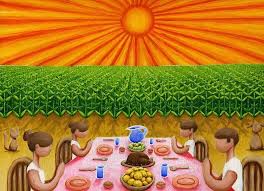THIRD SUNDAY IN ORDINARY TIME
“In one Spirit we were all baptized into one body, whether Jews or Greeks, slave or free persons, and we were all given to drink of one Spirit.” (1 Cor.: 12:12)
“Tell me, what is it you plan to do with your one wild and precious life?”
This daring question is asked of each of us by the renowned Pulitzer-prize winning poet, Mary Oliver, who died last week. Plagued by a childhood deeply wounded by abuse and continuing nightmares, Mary found the presence of an abiding and soothing Spirit in the beauties and wonders of creation. Her poetry spoke of the treasures to be discovered in the smallest creatures and the most ordinary of worldly objects.
Her plea to all of us was singular:
“Keep some room in your heart for the unimaginable.”
Saint Paul had something of the same vision. To him, all creation spoke of the wonders of the Creator, especially the gift of our bodies. He even goes so far as to say that “you are Christ’s body.”
You. Me. We are all a part of Christ! So much so, that, as Paul powerfully reminds us: “If one part suffers, all the parts suffer with it; if one part is honored, all the parts share its joy.”
What a vision of the world!
Paul used this metaphor of being “one body” as a symbol of social unity. He was deeply concerned with the issues of discord and division and of communities being torn apart. All of which, sadly, are concerns that haunt us to this day.
What Paul hoped to do in his plea for unity within the community he was addressing was to urge all its members to utilize their gifts for the common good. His overarching concern was for the unity of the church, the unity of the whole community he had founded.
If Paul had answered Mary Oliver’s question of what to do with his “wild and precious life,” I believe he undoubtedly would have responded that his every passion was directed at bringing about peace and unity for all people. He would argue as persuasively as he could that we need to bring an end to separating out “Jews or Greeks, slave or free persons.” He would instead passionately appeal to all of us to “drink of one Spirit.”
Why? Because all creation is “one body in Christ.”
For all its many faults, one thing the Roman Catholic Church is famous for is its emphasis on sacraments. It has always been an extremely sensuous church, unlike other forms of Christianity which variously reject art, wine, oil, candles, statues, stained-glass windows, and incense. It’s a church that is tangible, physical. It’s always used things you can see and touch and smell to help people experience a world bursting with hidden signs of a gracious God.
The Jesuit poet, Gerard Manley Hopkins, put it this way:
“The world is charged with the grandeur of God.
It will flame out, like shining from shook foil.”
Mary Oliver certainly believed that. So did Francis of Assisi. So did Paul of Tarsus. So did Jesus of Nazareth.
The genuinely Catholic experience has always held that God is not confined to church buildings. On the contrary, as one writer puts it:
“In the church’s eyes, our life, our holiness, our sanctity, our witness is to be found outside these walls, in the arena of our lives. Our sense of God’s presence is to be found in our prayer, our relationships, our work … and in the beauties of art and nature.”
But, you might ask, if all this is so, why the need to go to church?
We go to church: to remind us of all of this; to not let us forget who we are before God; to strengthen us in our resolve to live with a “Christ mind” through the gift of the eucharist; to enable us all the more to sense the special presence of God all around us; to see God’s face in every flower, in every wonder of nature.
Again, Mary Oliver, through her dazzling poetry, asks each of us a question in the tradition of Sacred Scripture, Jesus of Nazareth, Francis of Assisi, and many others through the centuries:
“Tell me, what is it you plan to do with your one wild and precious life?”
She is even bold enough to hint at an answer:
“Keep some room in your heart for the unimaginable.”
Ted Wolgamot, Psy.D.
11809194.1/23/2019
NOTE: Here is another of my favorite poetic verses from Mary Oliver. It is entitled “Praying”
“It doesn’t have to be the blue iris,
It could be
Weeds in a vacant lot, or a few
Small stones; just
Pay attention, then patch
A few words together and don’t try
To make them elaborate, this isn’t
A contest but the doorway
Into thanks, and a silence in which
Another voice may speak.”




